10 Best ERP Systems for Small Businesses in 2025
ERP
5 MIN READ
October 11, 2025
![]()
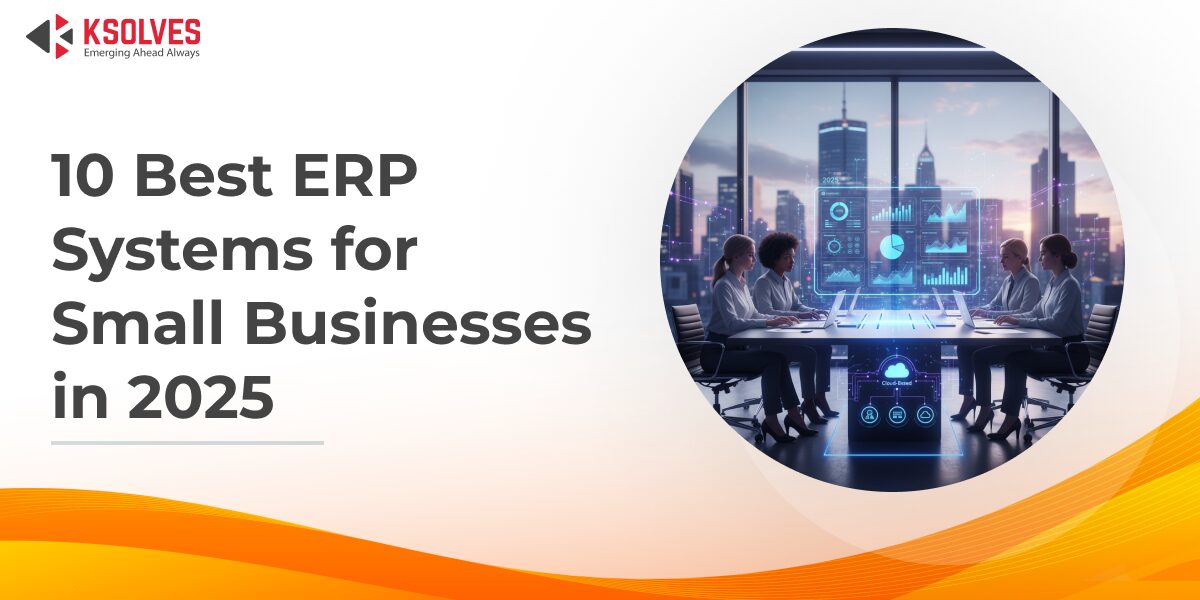
Are you a small business owner searching for the right ERP system to streamline your operations and stay competitive? In 2025, ERP systems for small businesses have become indispensable tools that help companies manage everything from inventory to customer relationships in one place.
The benefits of ERP for small businesses are clear. ERP systems offer improved efficiency, better data accuracy, and greater visibility into day-to-day operations. Forecasts indicate the global ERP market will grow from USD 65.2 billion in 2023 to approximately USD 200.7 billion by 2033, expanding at a CAGR of 11.9%, reflecting strong and sustained demand.
Modern ERP systems are designed to be cost-effective and flexible, making them accessible even for businesses with limited budgets. With real-time data and automation, small businesses can reduce errors, speed up processes, and make smarter decisions faster.
In this article, we’ll explore the top ERP systems for small businesses in 2025 and guide you on choosing the ideal solution that fits your specific needs and budget.
What is Enterprise Resource Planning (ERP) Software?
ERP software is an all-in-one platform that connects various teams across a business, equipping each user with the tools necessary to perform their tasks efficiently. ERPs serve a wide array of functions across industries by enhancing collaboration between departments, eliminating data silos, and streamlining workflows.
Common features of ERP software, organized by function, include:
- Accounting and Finance: tax management, general ledger, financial reporting, transaction tracking
- Inventory and Warehousing: inventory monitoring, automated stock management, replenishment, wave picking, shipping integrations
- Orders and Fulfillment: invoicing, reporting, payment processing, order tracking, validation, dropshipping
- Supply Chain: production data, tracking outstanding orders, demand forecasting, mobile device management
- Marketing and Sales: customer communication, sales forecasting, customer acquisition cost analysis, workflow management, project analytics
With an ERP system, data collected in one department is immediately accessible to others who need it, fostering seamless information flow.
For instance, in a merchandise company, sales orders entered by the billing team can automatically trigger shipments handled by the warehouse. The warehouse manager stays updated on order status, while the accounting team monitors revenue and expenses in real time. This ensures smooth coordination across the business.
Top ERP Systems for Small Businesses in 2025
Selecting the right ERP system is crucial for small businesses looking to improve operational efficiency, reduce costs, and gain a competitive edge. Here’s an in-depth look at the top 10 ERP solutions designed to meet the unique challenges of small businesses in 2025.
1. Odoo
Odoo ERP is a highly customizable open-source ERP platform that offers a wide range of business applications, all integrated into one system. It provides small businesses with an affordable yet scalable solution that grows with their operations. With over 30 main modules and thousands of third-party apps, Odoo supports everything from CRM and sales to manufacturing and accounting. Its user-friendly interface and modular design make it especially popular among startups and SMEs that want to adopt ERP in phases.
Key Features:
- Modular apps for sales, CRM, inventory, accounting, HR, and manufacturing
- Integrated eCommerce and website builder
- Automated workflows and real-time reporting
- User-friendly interface with mobile app support
- Affordable pricing with community and enterprise editions
Ideal for: Startups, SMEs in retail, manufacturing, and services; businesses seeking a customizable and scalable ERP at a reasonable cost.
[Also Read: How Odoo is beneficial in Manufacturing Industries]
2. Microsoft Dynamics 365
Microsoft Dynamics 365 is a cloud-based ERP and CRM solution that integrates tightly with Microsoft’s ecosystem, including Office 365 and Azure cloud services. It offers robust financial management, supply chain automation, and AI-powered insights to help small businesses optimize operations and make data-driven decisions. The platform’s scalability allows businesses to add modules as they grow, making it a flexible choice for a variety of industries.
Key Features:
- Comprehensive financial and project management tools
- Integrated AI and business intelligence dashboards
- Seamless integration with Microsoft Office apps
- Supply chain automation and warehouse management
- Cloud-based for easy remote access and collaboration
Ideal for: Small to mid-sized businesses across professional services, retail, manufacturing, and distribution that leverage Microsoft products and want cloud flexibility.
[Also Read: Odoo vs. MS Dynamics: Which One Is the Right Fit for Your Business?]
3. Oracle NetSuite
Oracle NetSuite is a leading cloud ERP platform that offers an all-in-one business management solution. It provides real-time visibility into financials, inventory, customer data, and eCommerce. NetSuite is ideal for growing small businesses and startups aiming to scale operations efficiently with built-in analytics, compliance management, and customizable dashboards. Its cloud-first approach ensures access anywhere with robust security and automatic updates.
Key Features:
- Financial management with automated billing and revenue recognition
- Inventory and order management with demand planning
- Customer relationship management (CRM) and marketing automation
- Built-in analytics and KPI dashboards
- Cloud-native platform with global compliance and multi-currency support
Ideal for: Fast-growing small businesses, especially in retail, wholesale distribution, and eCommerce, that need a cloud ERP with strong financial controls.
4. Epicor
Epicor ERP specializes in the manufacturing and distribution industries with tailored solutions that help small businesses optimize production, manage supply chains, and improve customer satisfaction. It offers a flexible deployment model with on-premise and cloud options. Epicor emphasizes industry-specific functionalities, helping manufacturers improve product lifecycle management and increase operational agility.
Key Features:
- Advanced production scheduling and shop floor control
- Supply chain and warehouse management
- Financial management and compliance tools
- Customer relationship management and service management
- Scalable cloud and on-premise deployment options
Ideal for: Small manufacturers, distributors, and industrial businesses seeking deep industry functionality with scalable ERP options.
5. SAP S/4HANA
SAP S/4HANA is an intelligent ERP suite designed to help small businesses run their processes in real time. Leveraging in-memory computing and AI capabilities, it delivers instant insights and automation across finance, supply chain, procurement, and sales. Though traditionally known for serving large enterprises, SAP offers tailored packages and cloud versions suitable for small businesses with complex needs.
Key Features:
- Real-time data processing and embedded AI
- Integrated finance, procurement, and supply chain management
- Intelligent automation and analytics
- Cloud and on-premise deployment flexibility
- Industry-specific solutions for manufacturing, retail, and services
Ideal for: Small businesses with complex operational requirements looking for cutting-edge technology and scalable ERP capabilities.
6. ERPNext
ERPNext is a fully open-source ERP platform designed to be simple, affordable, and adaptable for small businesses. It offers core functionalities like accounting, inventory management, HR, CRM, and project management through a clean, intuitive interface. Its cloud-based or self-hosted options provide flexibility for businesses with limited budgets or specific security needs.
Key Features:
- Modules covering accounting, inventory, sales, purchase, HR, and manufacturing
- Easy-to-use web interface with mobile support
- Workflow automation and real-time reports
- Community-driven with frequent updates
- Cost-effective pricing and open-source transparency
Ideal for: Small and micro-businesses, startups, and businesses in emerging markets seeking affordable and customizable ERP.
7. Acumatica
Acumatica is a cloud-first ERP solution that offers a flexible and scalable platform with strong financial and project accounting capabilities. It is known for its user-friendly interface and industry-specific editions, making it an excellent choice for small businesses in construction, manufacturing, retail, and distribution. Acumatica’s licensing model, based on resources rather than users, helps small businesses manage costs effectively.
Key Features:
- Financial management with multi-entity and multi-currency support
- Project accounting and inventory control
- CRM integration and customer management
- Cloud-based with mobile access and open API integrations
- Flexible licensing based on system resources
Ideal for: Small businesses across industries requiring project-focused ERP with cloud flexibility and cost control.
8. Infor
Infor ERP delivers industry-specific cloud suites designed to improve usability and streamline operations. It focuses on user experience and provides strong support for manufacturing, healthcare, retail, and distribution sectors. Infor’s cloud ERP solutions integrate advanced analytics and AI to help small businesses automate processes and improve decision-making.
Key Features:
- Financial and supply chain management
- Human capital management and customer experience tools
- Industry-specific functionality for manufacturing and healthcare
- Embedded analytics and AI-driven insights
- Cloud-based with modern user interface
Ideal for: Small manufacturers, healthcare providers, and retail businesses needing specialized ERP with AI-driven automation.
9. IFS Cloud
IFS Cloud is a modern ERP platform focusing on service management, manufacturing, and asset-intensive industries. It combines project management, service operations, and supply chain capabilities into a unified cloud solution. IFS is well-suited for small businesses looking to optimize field services and asset management with real-time visibility.
Key Features:
- Asset and service management with mobile support
- Project management and resource planning
- Supply chain and inventory control
- Cloud-native platform with AI and IoT integrations
- User-friendly interface tailored for service-centric businesses
Ideal for: Small businesses in manufacturing, aerospace, defense, and field services seeking integrated service and asset management.
10. Sage Intacct
Sage Intacct is a cloud-based financial management software that offers small businesses powerful accounting and financial reporting capabilities. It is recognized for its automation of complex accounting processes and compliance management. Sage Intacct integrates easily with other business tools, making it a preferred choice for companies focused on financial accuracy and scalability.
Key Features:
- Core financials with multi-entity and multi-currency support
- Automated revenue recognition and billing
- Real-time dashboards and custom reporting
- Seamless integration with CRM and payroll systems
- Cloud-based with robust security and compliance
Ideal for: Small businesses prioritizing advanced financial management and compliance across various industries.
How to Choose the Right ERP System for Your Small Business
Choosing the right ERP system can be a game-changer for small businesses, but only if approached strategically. Here’s a step-by-step ERP selection guide to help you make a confident, informed decision:
1. Assess Your Business Needs
Start with a detailed evaluation of your current processes. Identify gaps, inefficiencies, and manual tasks that could benefit from automation. Consider your goals—whether it’s improving inventory tracking, financial reporting, or customer management. This will help shortlist essential features for your business.
2. Set a Realistic Budget
Look for affordable ERP solutions that meet your needs without compromising core functionality. Consider both upfront costs (software licenses, hardware) and ongoing expenses (subscriptions, maintenance, upgrades). Open-source or cloud-based ERPs often offer more flexibility for small businesses with limited budgets.
3. Evaluate Vendor Reputation and Support
Vendor reliability matters. Research reviews, testimonials, and case studies. Ask about their experience with ERP implementation for small businesses. A vendor with solid post-implementation support can significantly reduce the risks associated with onboarding a new system.
4. Prioritize Scalability
Choose a solution that grows with your business. Many small companies outgrow their first ERP system because it lacks scalability. Opt for a platform that allows you to add modules and users as your business expands.
5. Understand the Implementation Process
Ensure your vendor provides clear guidance, training, and support during deployment. A phased rollout and adequate onboarding can reduce disruptions.
Summing Up!
In 2025, choosing the right ERP system isn’t just about keeping up, it’s about staying ahead. For small businesses, an ERP solution offers more than operational efficiency; it enables smarter decision-making, better collaboration, and sustainable growth. From automating inventory and finance to streamlining customer interactions, the benefits of ERP for small businesses are transformative.
However, selecting the ideal system can be challenging without a clear understanding of your business needs and the evolving ERP landscape. That’s where expert guidance makes a difference.
At Ksolves, we specialize in helping small and mid-sized businesses identify and implement affordable ERP solutions tailored to their goals and budget. Whether you’re scaling operations or digitizing legacy processes, our ERP consultants are here to guide you every step of the way.
![]()
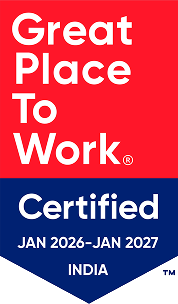
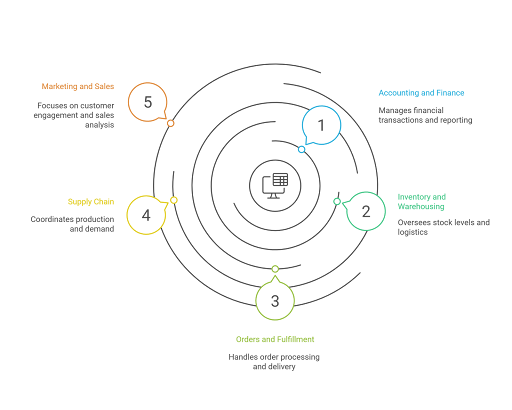
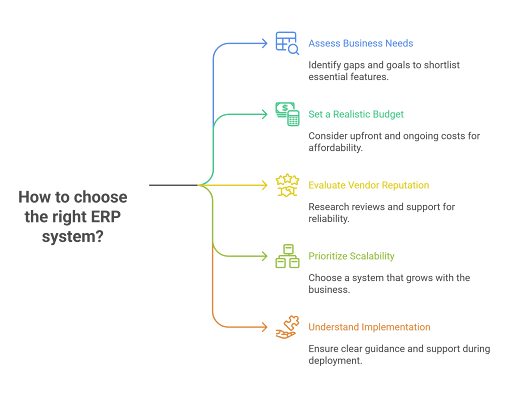
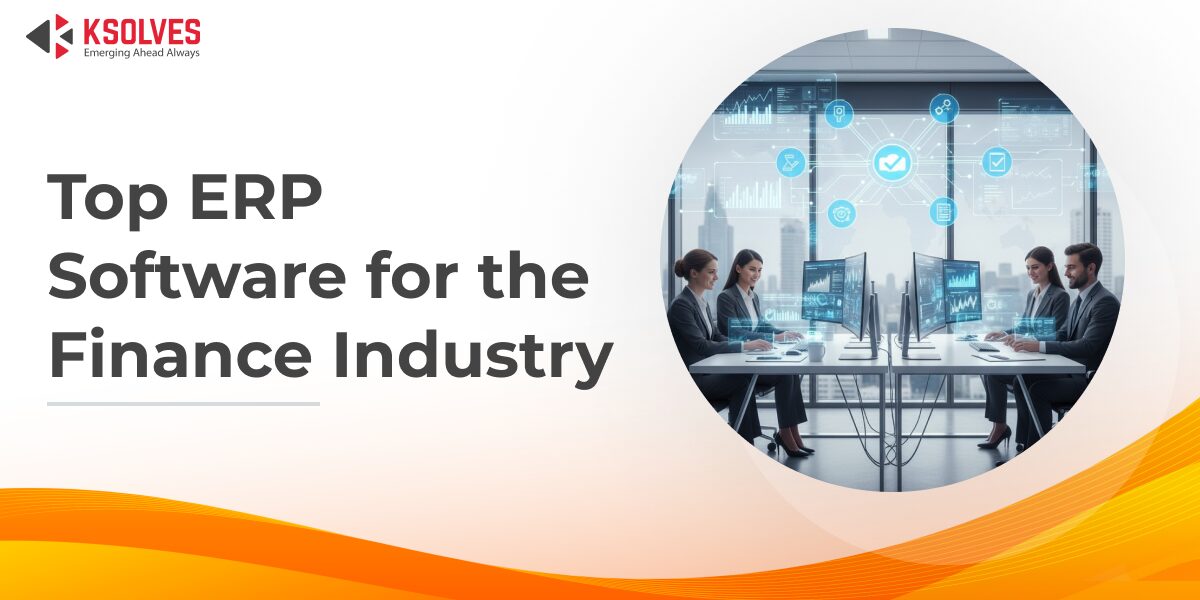
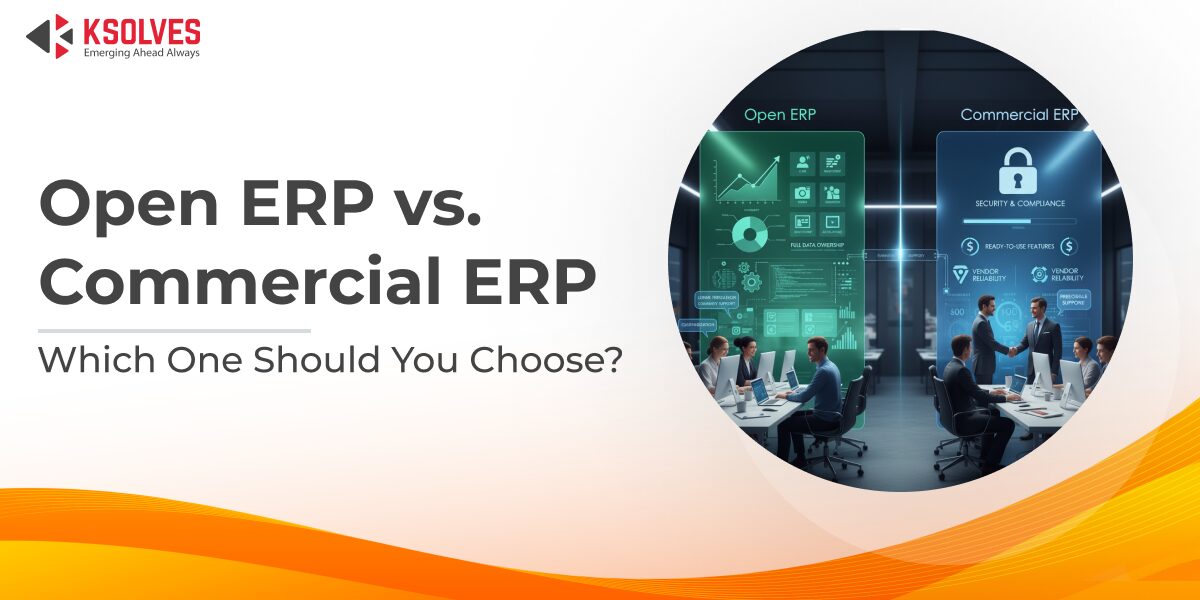
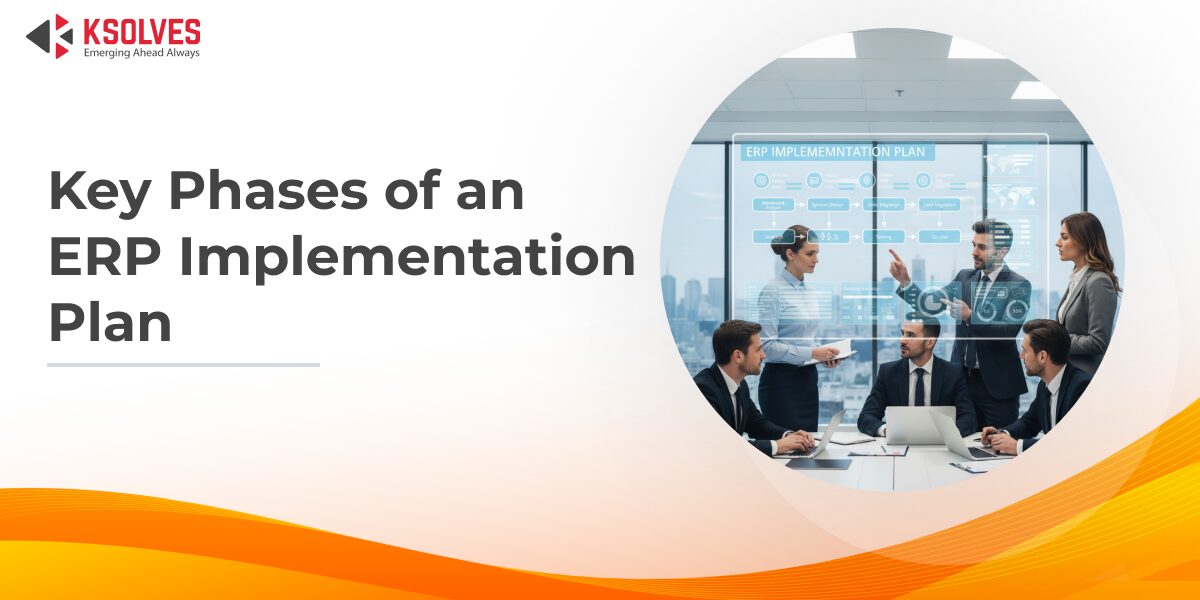




AUTHOR
ERP
Share with